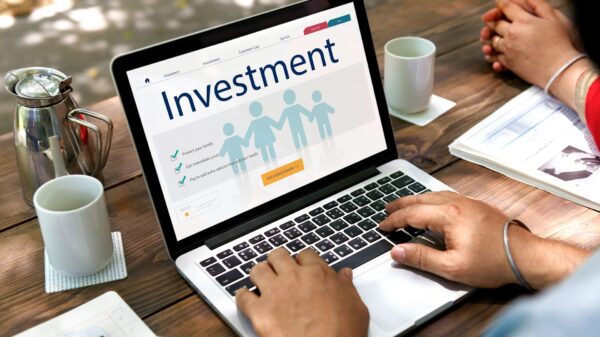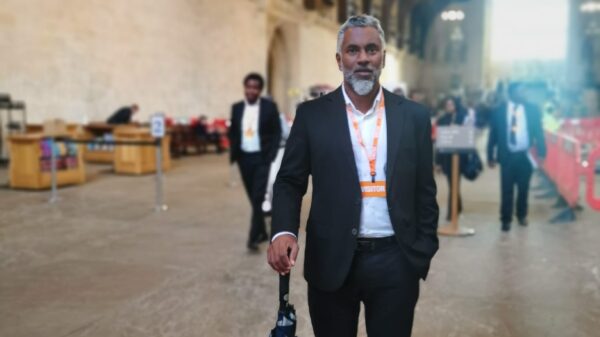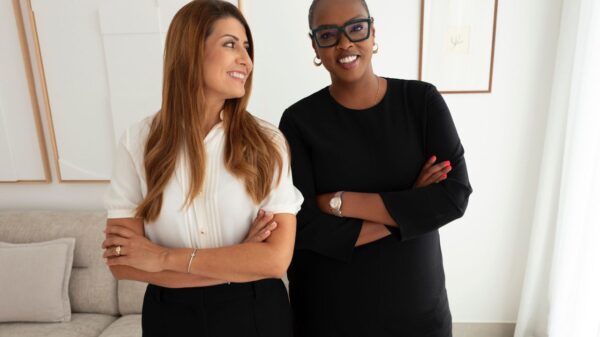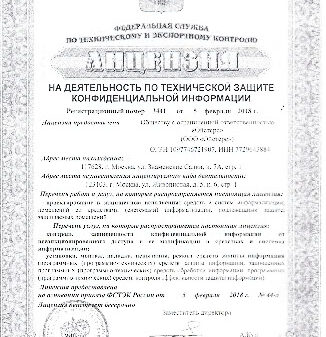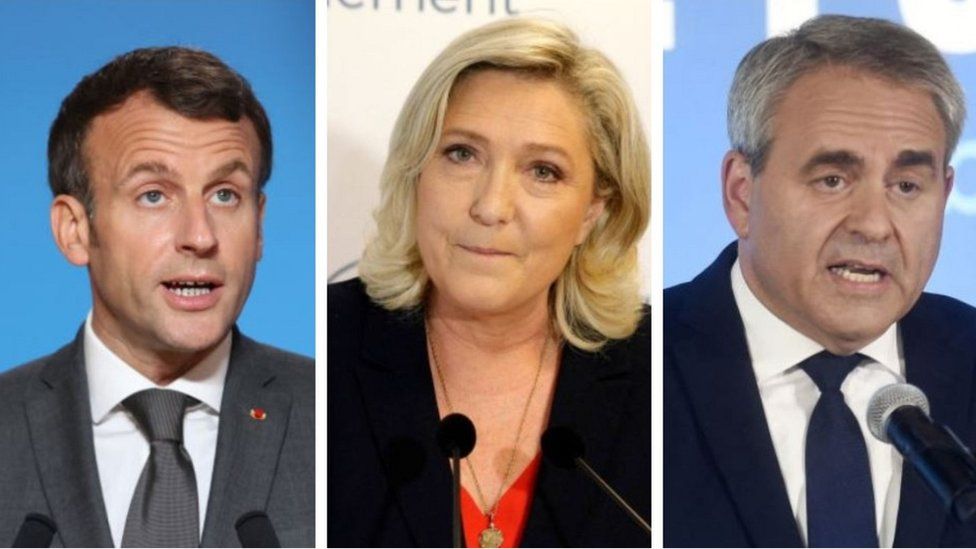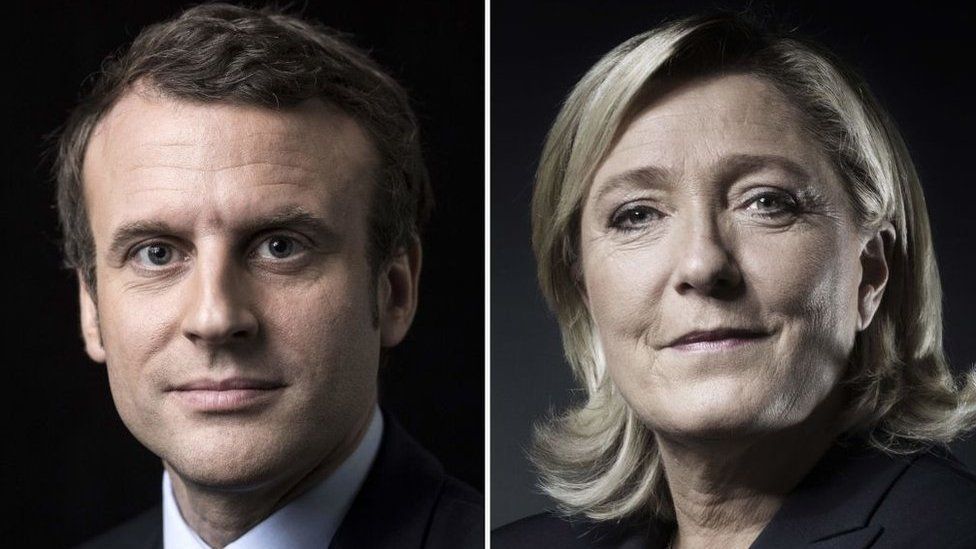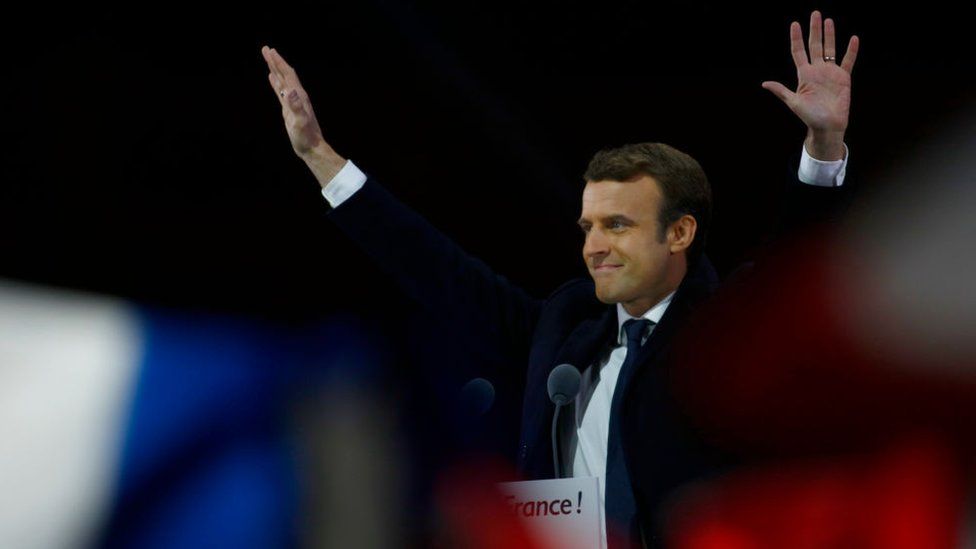
France is heading for a tight presidential race as incumbent Emmanuel Macron prepares to stake his claim for a second term.
Voters go to the polls in the first round of the presidential election on 10 April, and assuming no-one wins a majority, the top two candidates take part in a run-off two weeks later.
The winner will have the power to shape France and its key role in Europe for the next five years. Here we take a look at the contenders, and their chances of winning the top job.

Emmanuel Macron, La République en Marche! (Republic On The Move)
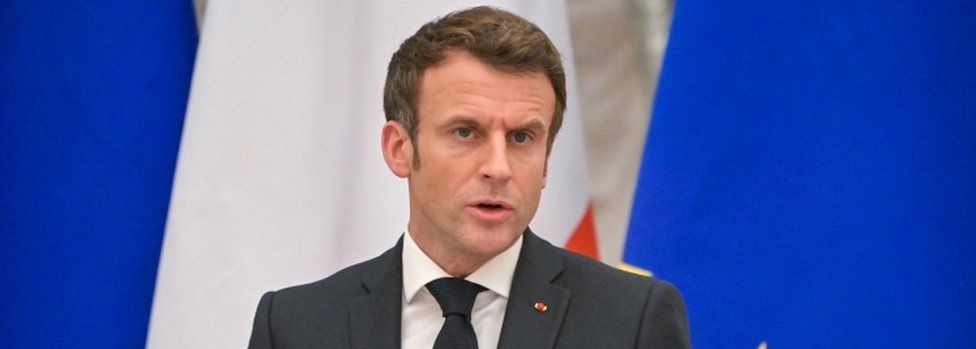
The 44-year-old president is still to declare his candidacy officially, but it is just a matter of time.
His rise to the political summit was meteoric, becoming France’s youngest ever president in 2017, less than a year after launching a centrist political movement challenging the traditional parties.
He had previously served as economy minister under President François Hollande, but was an unknown quantity – an investment banker who had never run for elected office.
To many voters, that set him apart from the ruling class, and he came to power with 66.1% of the vote, easily defeating far-right candidate Marine Le Pen.
He has had to navigate choppy political waters, relying on a parliamentary majority to push through controversial reforms.
He made it easier for companies to fire workers, cut taxes and introduced tough security laws to tackle terrorism. But he was forced to scrap a proposed fuel tax in 2018 after weeks of unrest stoked by yellow-vest protests, known as gilets jaunes.
Other reforms, including a promise to bring unemployment down from over 10% to 7% by 2022, were hit by the Covid pandemic. France initially imposed one of Europe’s strictest Covid lockdowns and has since fully vaccinated a large proportion of its population.
A vulgar attack on France’s unvaccinated caused Mr Macron no harm at all – but his government’s attempts to turn a health pass into a vaccine pass met with strong resistance.
What are his chances?
Mr Macron has a strong chance of victory, with polls giving him 25% of the vote, well ahead of his main rivals on the right and far right. But a run-off against right-wing Republicans challenger Valérie Pécresse could prompt a close race.

Marine Le Pen – Rassemblement National (National Rally)
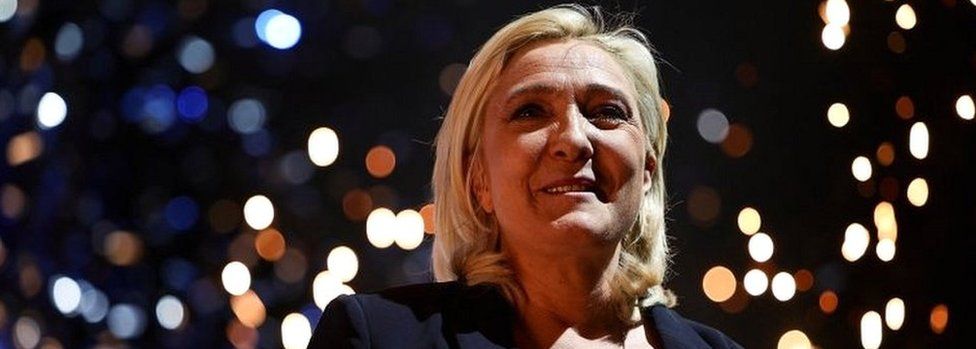
Marine Le Pen’s family has been synonymous with the far right in France for decades. She took over the running of France’s far-right National Front from her father, Jean-Marie Le Pen in 2011 and steered it closer to the mainstream in 2015.
A political player in France for years, she became a Euro MP before acting on her presidential ambitions.
Runner-up to Emmanuel Macron in 2017, she then rebranded her party as Rassemblement National, or National Rally.
Marine Le Pen, 53, has since crafted a consistent anti-immigration, anti-EU message that has resonated with disaffected voters.
She has promised to halt abuse of the right to asylum, with a referendum on restricting immigration. She also seeks to turn the European Union into an alliance of nations unchallenged by EU laws.
However, she can no longer claim the hard-right vote to herself, because of strong pressure from fierce rival Eric Zemmour. Some of her team have defected.
What are her chances?
This is her third bid for the presidency (she came third in the 2012 election). She is polling well – but faces a battle to reach the run-off.

Valérie Pécresse – Les Républicains (The Republicans)
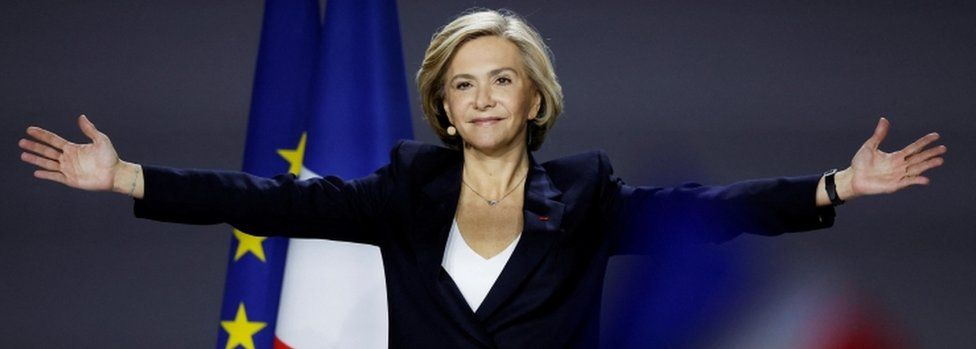
“I am ready to be the first woman president of the Republic,” said Valérie Pécresse on declaring her candidacy in July last year.
Since 2015, she has served as the first female leader of the Île-de-France regional council, which covers Paris.
When France’s right-wing Republicans chose her to be their first ever female presidential candidate she climbed quickly in the polls, but has since fallen back amid a lacklustre campaign and defections in her party.
A speaker of four languages including Russian, she entered politics as part of President Jacques Chirac’s team, but made her political reputation as a higher education minister from 2007-11 under Nicolas Sarkozy.
Ms Pécresse spearheaded reforms to higher education that were met with a wave of strikes.
Considered pro-European and moderate, she has staked out some of Mr Macron’s centrist territory, while taking a hard line on typically right-wing issues such as immigration, integration and Islam.
Some party colleagues have accused her of moving too far to the right, by focusing on nationalism and appearing to embrace an anti-Muslim conspiracy theory.
In her own words, she prefers to describe herself as “one-third Margaret Thatcher and two-thirds Angela Merkel”.
What are her chances?
Initially seen as the main obstacle to a Macron victory, Valérie Pécresse has faltered. Her speech at a February rally in front of 7,500 party supporters was widely mocked as wooden and awkward.

Éric Zemmour – Reconquête (Reconquest)
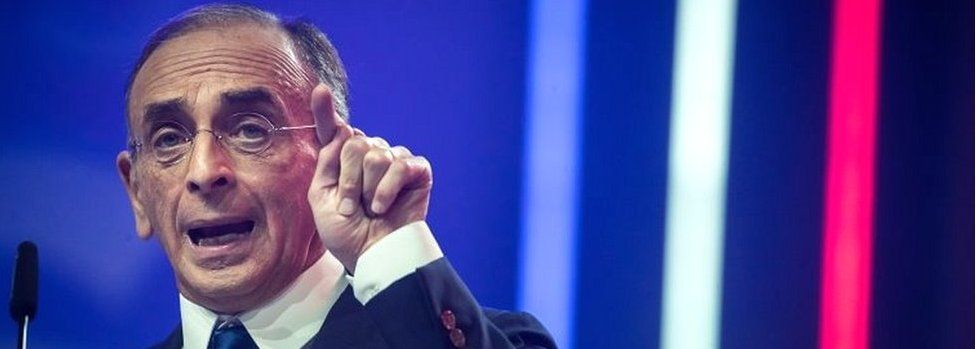
A journalist, author and TV commentator with no election experience and a conviction for inciting racial hatred would not typically be considered presidential material in French politics.
But far-right challenger Éric Zemmour, 63, has built a career on positioning himself against what he calls a “politically correct consensus” and now offers a “reconquest” – Reconquête – of France.
He burst on to the political scene in 2021 during a national tour to promote a book lamenting the perceived decline of France, which he mostly blames on immigration and Islam.
This video can not be played
To play this video you need to enable JavaScript in your browser.
He surged in the polls, even before declaring his candidacy, offering a nationalism seen as tougher than Marine Le Pen’s.
He has courted controversy for minimising the guilt of Philippe Pétain, the head of France’s collaborationist government, in the Nazi deportations of Jews in World War Two.
Mr Zemmour has called for a ban on first names that are not French, telling one woman on live TV her parents had no right to call her Zina. He also wants dual national repeat offenders to be stripped of French citizenship and a ban on wearing the hijab in public.
His views may revolt his critics, but he continues to dominate the airwaves with a divisive campaign modelled on that of former US President Donald Trump, and he is the only candidate to have spoken to Mr Trump as part of his campaign.
At one raucous rally, which saw him attacked by a protester, he railed against political elites and said his election victory would be a “reconquest”.
What are his chances?
He is performing well in the opinion polls – but he may do more to dash Ms Le Pen’s hopes of reaching the run-off instead of fulfilling his own.

Jean-Luc Mélenchon – La France Insoumise (France Unbowed)
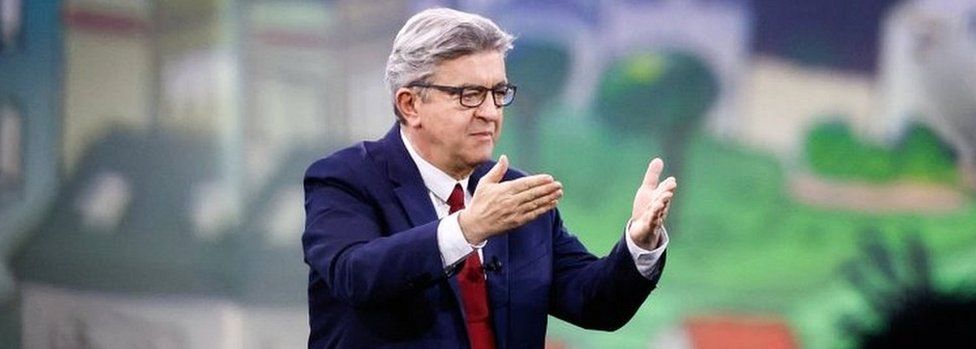
The strongest candidate on the left is veteran agitator Jean-Luc Mélenchon, a staunch critic of Emmanuel Macron’s economic policies and a prominent supporter of the yellow-vest protests.
At 70, he remains a fiery campaigner though few believe he could go all the way to the presidency.
Mr Mélenchon dropped a career in teaching and journalism for left-wing politics in the 1970s. He served briefly as junior education minister under Socialist Prime Minister Lionel Jospin but – by the early 2000s – became disillusioned with the Socialist party’s rightward drift.
After setting up a new left-wing party he became a Euro MP and stood twice for the presidency under the title La France Insoumise – France Unbowed.
He galvanised voters in 2017 with a promise of higher state spending, a top tax rate of 90%, and sweeping constitutional reform for a Sixth French Republic. His platform is little different in 2022, with a call for a big rise in the minimum wage.
What are his chances?
He has so far failed to achieve the momentum that earned him 19.6% of the vote in 2017, but is the strongest among an array of left-wing candidates.

Other candidates in race on the left
Yannick Jadot – Europe Écologie Les Verts (Europe Ecology – The Greens)
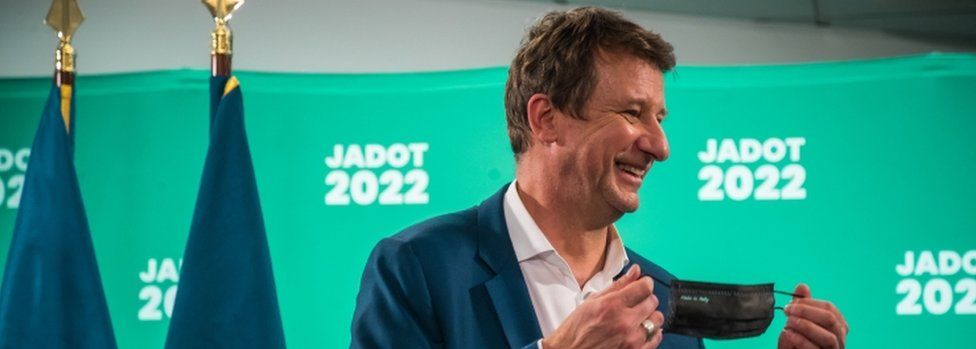
A former Greenpeace militant and an MEP since 2009, Yannick Jadot was picked by the Greens via an online primary.
He wants France to ditch nuclear power within 20 years, whereas Emmanuel Macron has just backed plans for another six nuclear reactors to be built.
As well as pushing for a big change in income tax, with additional levels for higher earners, Mr Jadot would like to see a citizen’s income guaranteed for all over-18s.
He has been vying with ex-Paris mayor Anne Hidalgo to be the champion of the mainstream left, and could influence on how leftist supporters vote in the presidential election.
Fabien Roussel: The first Communist candidate for 15 years, his charismatic approach has had some success. Mr Roussel, 52, has called for France’s big banks to be nationalised and for pay rises for public servants including nurses and teachers.
Christiane Taubira: A former Socialist justice minister, she won a popular primary aimed at uniting the left under one roof. It never happened as the other big candidates ignored it. She has barely figured in the polls.
Anne Hidalgo: Chosen as candidate for the Socialists, her struggle in getting voter support reflects the deep decline of a party that ran the country only five years ago, under President François Hollande.
Nathalie Arthaud: A schoolteacher from outside Paris, she has stood twice for president for the Lutte Ouvrière union,but has not yet attracted more than 1% of the vote.
Philippe Poutou: The former car factory worker is standing for the New Anti-Capitalist party and advocates redistribution of wealth.

Other candidates on the right:
Nicolas Dupont-Aignan: A libertarian who left the mainstream right to found the Debout la France (France Arise) party, he sees Emmanuel Macron as a danger to France and backs alliance with Russia.
Florian Philippot – Les Patriotes (The Patriots): A former party colleague of Marine Le Pen, he has placed Frexit, or French withdrawal from the European Union, at the heart of his campaign. The far right is a crowded stage and his message is struggling to be heard.






